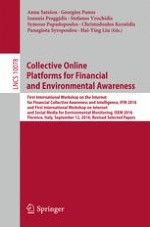2016 | Buch
Collective Online Platforms for Financial and Environmental Awareness
First International Workshop on the Internet for Financial Collective Awareness and Intelligence, IFIN 2016 and First International Workshop on Internet and Social Media for Environmental Monitoring, ISEM 2016, Florence, Italy, September 12, 2016, Revised Selected Papers
herausgegeben von: Anna Satsiou, Georgios Panos, Ioannis Praggidis, Stefanos Vrochidis, Symeon Papadopoulos, Christodoulos Keratidis, Panagiota Syropoulou, Hai-Ying Liu
Verlag: Springer International Publishing
Buchreihe : Lecture Notes in Computer Science
